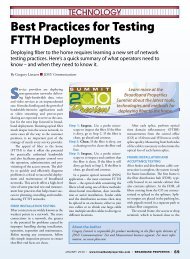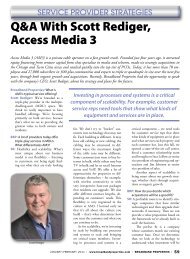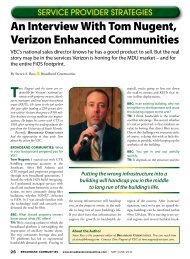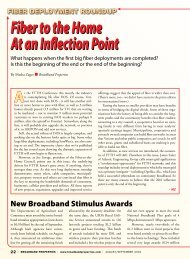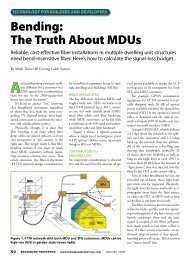TecHnoLoGy - Broadband Properties
TecHnoLoGy - Broadband Properties
TecHnoLoGy - Broadband Properties
You also want an ePaper? Increase the reach of your titles
YUMPU automatically turns print PDFs into web optimized ePapers that Google loves.
THE LAWFarrell: You can put provisions in thecontract and if the FCC comes out with a rulethat you can’t have exclusive marketing or youcan’t have a bulk deal, we’ll renegotiate thedeal so it’s mutually beneficial to all parties.bottom line is, you still have to do contracts.And it is impossible for any of theattorneys up here to envision every possiblescenario that could take place.You still have to do your best to geta contract that you’re happy with andthat your provider can live with, to negotiatesome of the terms about some ofthe possible things that could happenfrom future FCC actions. But you haveto move forward with deals. Don’t letthe uncertainty prevent you from doingwhat you need to do to get servicecontracts done. If you have a good relationshipwith a provider and somethingchanges down the road that makes aprovisional contract you sign now iffy,pick up the phone and call the providerand work something out.Exclusive MarketingWith respect to exclusive marketing, itis an open issue. I don’t think the FCChas anything in the record that wouldlet it ban exclusive marketing, and theredoes not seem to be anyone in favor ofsuch a prohibition. But if they do, thereare ways of addressing it. I’ve dealt withalmost every attorney up here to comeup with solutions. They aren’t perfect,no one walks away perfectly happy, butthey’re contingencies in case somethinglike that does happen.Davis: Unlike my Washington, DC,brethren, I’m the redneck on the panel.How can I resolve these things and becreative? Address what happens giventhe possible combination of new technologieswhether it be FiOS, whether itbe users’ DIRECTV dishes or an MDUsatellite hookup or all in combination.Put together strategies that are ethical,to be able to continue to do businesswithout having a massive impact onyour profits.Farrell: Property owners want toprovide choice, and that’s what theirresidents want. They want to choosewho they can use. In terms of enteringinto contracts, I think the same considerationsapply: You want to enter intoa contract with a company you knowis going to be around for a long time, acompany that provides a breadth of services,like Internet access. One can seewhere a lot of residents of apartmentsuse their computers outside the home –at the coffee shop, to travel. Does a provideryou’re entering into an agreementwith have a lot of WiFi hotspots? And,long-term, who’s going to be the bestprovider at your property?Sure, the FCC is looking at exclusivemarketing. Most people who have commentedto the FCC in that proceedingsay they believe exclusive marketing isfine and that it should be permitted.Looking at comments on bulk, mostof the providers think bulk deals aregood. There are some consumers whosaid bulk deals aren’t good. You can putprovisions in the contract and if the FCCcomes out with a rule that you can’t haveexclusive marketing or you can’t have abulk deal we’ll renegotiate the deal soit’s mutually beneficial to all parties.Glivar: I’m not sure the ownerswould all agree. At the end of the day,the take I have on it is the FCC says youcan’t do exclusive video deals with cablecompanies and ILECs and CLECs. Atthe end of the day, I think everyone onthis panel knows you can’t do exclusivedeals. You can’t write it into contracts.But we also agree that the ruling doesn’tchange the world greatly. I think thereare different perspectives on whether itgives owners more options or not.Kandutsch: I represent a PCO, sothis rule as of now doesn’t apply to us. ButI agree with everybody who says that theimpact of the exclusive rule is not [there]from our perspective because we see thatfewer and fewer of the larger propertyowners are willing to make an exclusiveagreement anyway. So even before thisruling came out we were thinking abouthow we can adjust our business model toaccommodate that real-world fact, andwe believe we can compete with otherswithout exclusive agreements.I think the next thing that needs tobe done from a public policy point ofview is that on the one hand you see thegovernment opening up buildings tocompetition and on the other hand westill have two parallel sets of wiring rules,one for telecommunications and one forvideo. That doesn’t make any sense.Applying Inside Wiring RulesKane: Wiring seems to be the greatestsource of confusion in the market rightnow. When are the inside wiring rulesapplied?Hubacher: The FCC inside wiringrules apply only when the inside wiringis owned by the provider. If the buildingowner owns the inside wiring, thoserules are not a factor.Kane: So when the owner owns thewiring and the owner is bringing inbroadband providers, what should theowner take into consideration?Davis: When the property ownerowns the wiring and there’s an incumbenton the property using the wiring,the first thing you have to do before youdeal with a new provider is to look atyour contract to see what rights you havegiven the incumbent in the first place. Ifyou have given the incumbent an exclusiveright to use the owner-owned wiring,then you don’t want to put yourselfinto breach of contract by allowing thenew provider to use that same wiring.In a perfect world each child gets itsown toy. You may want to figure out away to share and if at all possible putblankets in your contract about participatingusing reasonable efforts and thosesorts of things. But if you can figure outa mechanism by which you don’t haveto let the children share, then that’s terrific.You had better think about it nowbecause it will come up and you will get88 | BROADBAND PROPERTIES | www.broadbandproperties.com | July 2008





